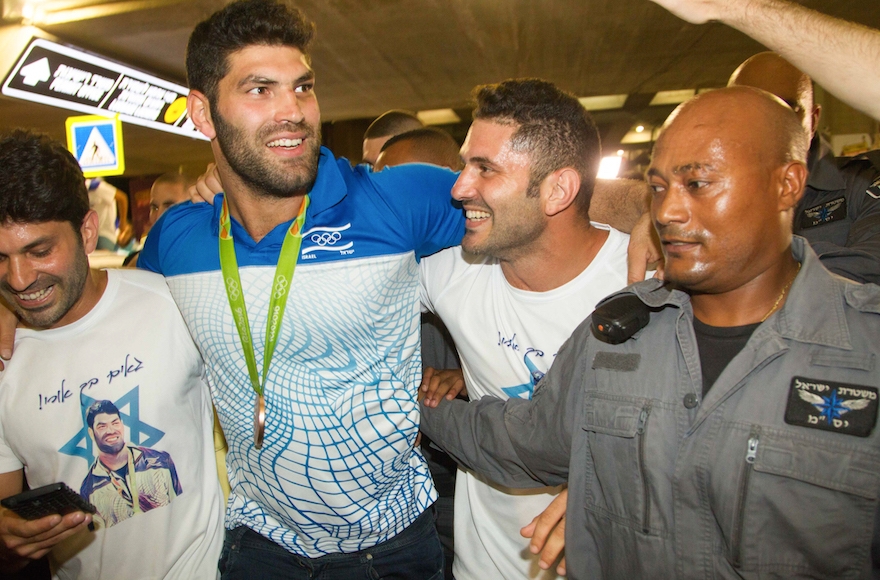TEL AVIV (JTA) — The Jewish state has nearly made it through another Jewish year and, as always, there was plenty to kvetch about in 5776.
But Rosh Hashanah, the Jewish New Year, is a time to take stock and celebrate.
Before the shofar blowing begins, here are five Israeli stories from the past year worth trumpeting. Expect them to echo into 5777 and beyond.
The Olympics gave Israelis reason to hope.
For Israel, the margin between Olympic disappointment and glory can be a single medal. The country came up empty in 2012, but two Israeli judokas grappled and leg-swept their way to bronze at the Rio games in August.
Their fellow citizens rejoiced: Waving flags and singing patriotic songs, hundreds thronged Ben Gurion Airport to give Yarden Gerbi and Or Sasson a hero’s welcome. The athletes were showered with flowers and hugs, and were immortalized by countless selfies. Prime Minister Benjamin Netanyahu later met with the judo team.
The Olympics have special meaning in Israel, where everyone remembers the 1972 Munich massacre of 11 athletes and coaches by Palestinian terrorists. The Rio games kicked off with Lebanese athletes refusing to share a bus to the opening ceremony with the Israeli delegation. And days before Sasson won his medal, a defeated Egyptian adversary pointedly refused to shake his hand. Israelis booed along with the crowd at the stadium.
Israel’s new medals brought the country’s total to nine since 1952.
Hoped-for windsurfing and rhythmic gymnastics successes proved elusive — and, as usual, some Israelis bemoaned inadequate national investment in the Olympics.
Yet there were reasons to be buoyant. Seven Israelis made it to the finals in Rio, and the country competed in 17 sports, up from 10 in London, including three newer ones: golf, triathlon and mountain biking. Israel Olympic Committee CEO Gili Lustig has promised to do “some thinking” about improving Israel’s showing at Tokyo in 2020.
Israel made new friends in a hostile world.
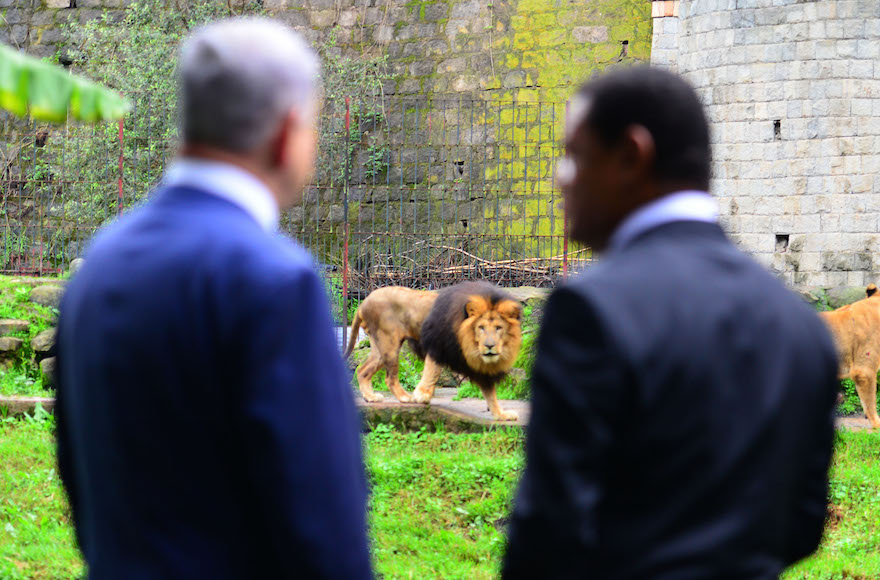
Israeli Prime Minister Benjamin Netanyahu, left, and President Mulatu Teshome of Ethiopia viewing lions at the presidential compound in Addis Ababa, July 7, 2016. (Kobi Gideon/Israeli Government Press Office)
As the Olympics reminded Israelis, their country is unlikely to win any international popularity contests. But in the past year, Prime Minister Benjamin Netanyahu’s government managed to find some new friends and potential allies.
Israel and Turkey officially reconciled recently following a six-year falling-out over the Mavi Marmara affair. While the deal, signed in June, may not make the countries BFFs again, it should help them cooperate amid the chaos of the Middle East. Exporting Israel’s natural gas bounty and rebuilding the Gaza Strip are potential joint projects.
Meanwhile, the shared threats of Islamic extremism and Iran have brought Israel closer to the region’s Sunni Muslim states, even if those states are loath to admit it. Weeks after a telling handshake with Israel’s Foreign Ministry director-general, Dore Gold, Saudi government adviser Anwar Eshki publicly led a Saudi delegation to Jerusalem. And Gold flew to Cairo to reopen the Israeli Embassy there — four years after protesters stormed the building and forced its closure.
In an update of former Prime Minister Golda Meir’s Africa policy, Netanyahu toured the continent for four days in July. Offering Israeli high-tech and security know-how and seeking diplomatic support, he was received in country after country like the leader of a world power.
Looking east, Gold has said Israel is building new relations with Asia. Last year, Israeli exports to Asia surpassed those to the U.S. for the first time. And Chinese investment in Israeli companies and venture capital funds reached record highs. Spurred by the civil war in Syria, Netanyahu and Vladimir Putin are in regular contact, and the Russian president may be plotting an Israeli-Palestinian peace push of his own. Who isn’t?
Haredi Orthodox men in Israel rolled up their sleeves.
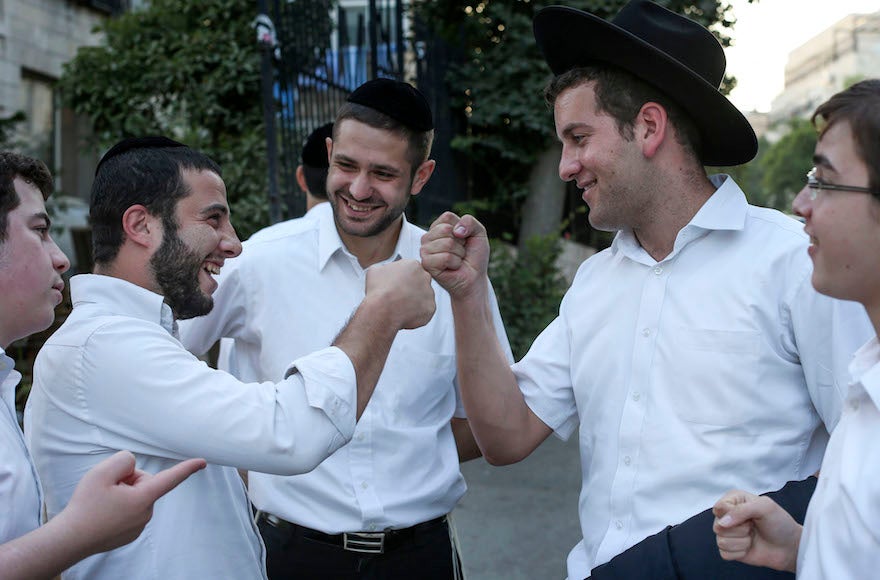
Young haredi Orthodox Jews during a break from studying at the Yeshiva Ateret Israel in Jerusalem, Sept. 2, 2013. (Nati Shohat/Flash90)
A majority of haredi Orthodox men in Israel have jobs. That may not seem worth blowing the shofar about, but it’s a first. Since officials started keeping track, most of the demographic has been out of work.
In 2015, the workforce participation rate for haredi men was 52 percent, part of a 12-year rise since the figure was 36 percent in 2003, Israel’s Central Bureau of Statistics reported in February. Haredi men in Israel have long preferred Torah study to work or army service, living off yeshiva stipends, state benefits and perhaps their wives’ salaries.
Haredi women are even better represented in the workforce at a rate of 73 percent, according to the government — more or less the same as among secular Israeli women. Israel’s overall workforce participation rate is 80 percent.
Many observers see a larger trend of haredi society opening up to the outside world due in part to public and private investment — despite successful haredi reversal of political reforms aimed at integrating the community. Today, an estimated 11,000 haredi Jews are studying at institutes of higher education, 5,000 are in the army and most are said to have internet access.
On a seemingly related note, haredi birth rates have fallen. A surge in the relative size of haredi preschool enrollment during the first decade of the millennium provoked much handwringing about the growing economic and social burden. But the trend has quietly reversed, with haredi schools accounting for less than 23 percent of preschoolers in 2015, down from more than 25 percent in 2008, according to the Taub Center for Policy Studies in Israel.
The share of preschoolers in Arab-Israeli schools has fallen even further. But the government has some work to do to reach its goal of putting more Arab women to work.
More women than ever were making Israel’s laws.
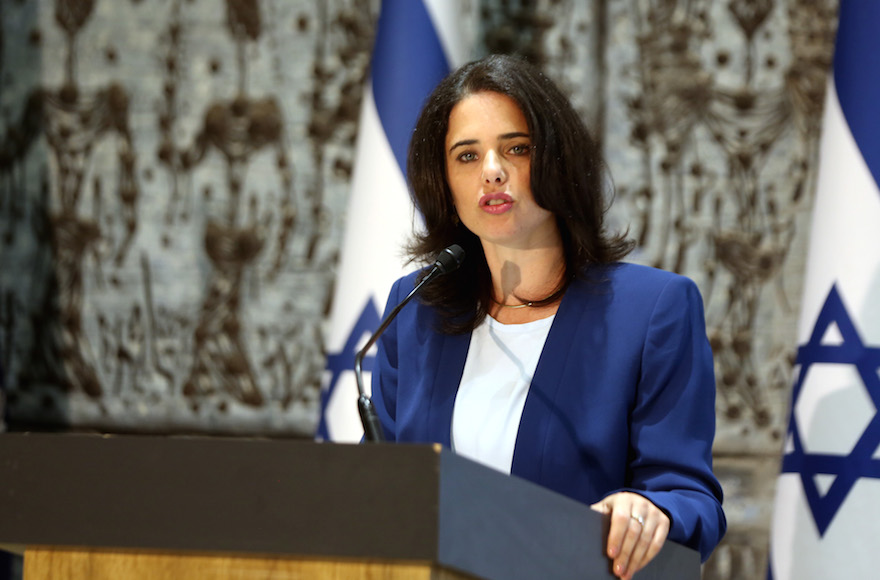
Justice Minister Ayelet Shaked speaking in Jerusalem at a swearing-in ceremony for judges, July 28, 2016. Shaked is one of four female government ministers in Israel. (Yossi Zamir/Flash90)
The 28 women elected to Israel’s parliament in 2015 set a record. Since then, political reshuffling has seen the number move a little higher.
When Avigdor Liberman became defense minister in June, his Knesset seat went to Yulia Malinovsky, a member of his hawkish Yisrael Beiteinu party — sending the number of female lawmakers to 33. That’s right, more than a quarter of the 120 legislative seats are now occupied by women.
These lawmakers span the political spectrum. From left to right, there is the anti-Zionist firebrand Haneen Zoabi of the Arab Joint List; peacenik Zehava Galon, the chairwoman of Meretz, and self-described “religious right-winger” Tzipi Hotovely of the ruling Likud. Notably absent are any haredi Orthodox women, whose parties prohibit them from running.
Four of the 21 government ministers are also women: Justice Minister Ayelet Shaked of Jewish Home; Culture and Sport Minister Miri Regev and Minister for Social Equality Gila Gamliel, both of Likud, and Immigrant Absorption Minister Sofa Landver of Yisrael Beiteinu.
Despite the ideological diversity, the women lawmakers sometimes come together to tackle issues related to their gender, including in the Knesset’s Committee on the Status of Women and Gender Equality. Given lawmakers’ personal experience, sexual harassment may well be on the agenda when the Knesset starts its winter session in October.
The government backed adding Sunday to the Israeli weekend.
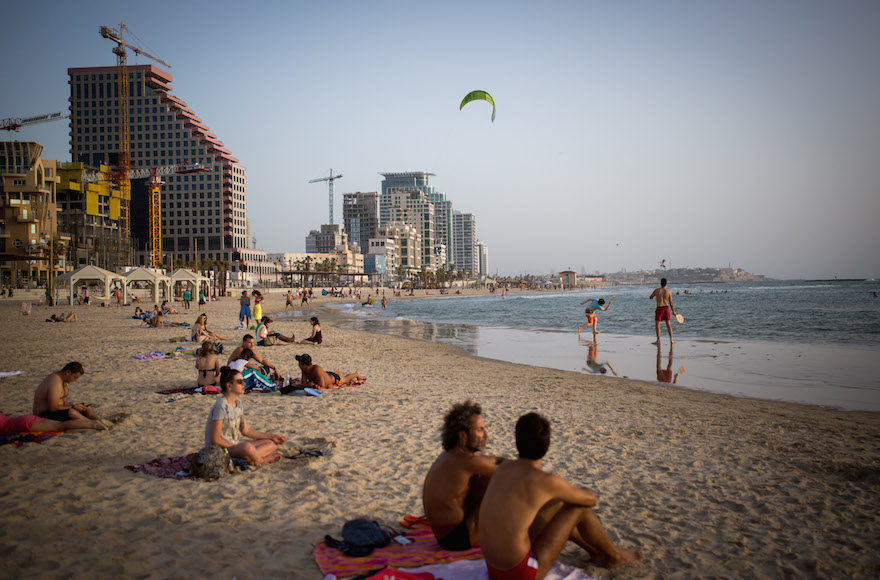
Israelis enjoying the beach in Tel Aviv, May 16, 2016. (Miriam Alster/Flash90)
Israel this year took a tentative step toward redefining its weekend. In June, ministers approved a bill that would give Israelis six three-day weekends a year starting in 2017 as a step toward making Sunday a day off. The legislation is to be reworked in committee before going to the full Knesset for voting.
Israeli weekends now run from Friday afternoon through Saturday to accommodate the Jewish Sabbath and Muslim Friday prayers. Many Israelis don’t work on Friday. But for religiously observant Jews, Shabbat rules prevent them from driving or visiting most entertainment venues from Friday night until Saturday night, allowing precious little time for fun.
Economists are divided on the merits of adding Sunday to the weekend. Supporters argue the plan would boost the economy by syncing Israel with the rest of the world and promoting consumption by a wider swath of Israeli society. Opponents worry it would reduce productivity, with observant Jews and Muslims getting less done on Fridays, and everyone potentially struggling through longer days to compensate for the long weekend.
But c’mon: Sunday Funday!
RELATED:
6 ways Israel is counting its blessings on Independence Day
JTA has documented Jewish history in real-time for over a century. Keep our journalism strong by joining us in supporting independent, award-winning reporting.
